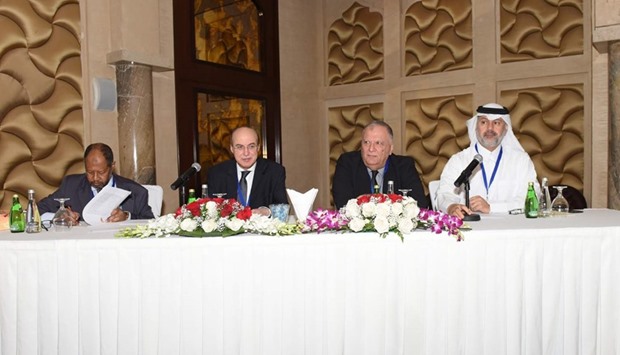Hamad Medical Corporation (HMC) recently organised a forum dedicated to exploring issues relating to men’s health, the first forum of its kind in Qatar.
Forum participants comprised of HMC specialists in renal surgery, urology, endocrinology and diabetes, cardiology, psychiatry, community medicine and tobacco control. There were also participants from other government ministries and the private sector.
Dr Khalid al-Rumaihi, senior consultant and head of the Department of Renal Surgery and Urology at HMC, and president of the forum, said: “The aim of this forum was to emphasise that men’s health means helping them enjoy integrated health physically, mentally and sexually from their adulthood until old age.”
Dr al-Rumaihi said lectures delivered at the forum included examining the effect of androgens on men’s health especially during the advanced age; erectile dysfunction (ED) as an indicator for heart disease; the impact of enlarged prostate on men’s health; the relationship between smoking and impotency in men; as well as the importance of proper nutrition and the impact of obesity on male sex hormones. The forum also addressed the impact of social media on men’s health.
Dr al-Rumaihi expressed hopes that the forum will be held annually and could evolve into a men’s health club to serve as a medical outreach in the community.
Dr Jassim al-Suwaidi, senior consultant cardiologist at HMC, who delivered a scientific lecture at the forum, pointed out that ED among men is an early indicator for diseases of the heart and arteries. He referenced recent studies which indicate a direct correlation between intensity of infection with ED and potential exposure to the risk of heart clots. Dr al-Suwaidi also pointed out other factors that could lead to heart disease and affect potency in men include diabetes, high blood pressure, increased cholesterol and smoking, adding that it is important to check the heart health of any patients with ED in order to begin the correct treatment early.
HMC’s Medical Education Centre wins international recognition
Hamad Medical Corporation’s (HMC) Medical Education Centre has been recognised by the Joint Commission International (JCI).
HMC is the largest Academic (teaching) Medical Center (AMC) in Qatar and one of the largest in the region providing secondary and tertiary medical care.
The provision of high quality training for medical residents and junior doctors is globally considered to be a key factor in the delivery of excellent patient care. Achieving the position as an internationally recognised teaching institution was a crucial element in the Corporation receiving the official JCI Gold Seal of Approval for accreditation under the Academic Medical Centre Hospital standards earlier this month.
HMC’s Medical Education Centre accreditation was the result of meeting stringent standards required by two additional JCI Chapters: Medical Professional Education and Human Subject Research.
Dr Abdullatif al-Khal, Deputy Chief Medical Officer and Director of Medical Education at HMC explained the importance of having an accredited AMC: “Our accredited Graduate Medical Education (GME) programme is designed to deliver high quality training to our residents and ensure that our young doctors have high competence levels that will help them take better care of their patients.”
“Receiving AMC accreditation and meeting exacting medical education standards reflect that the training we deliver to hundreds of young doctors and residents each year is of the highest international standards. It is very important to have the right setting to provide proper medical teaching that ensures the safety of our patients as well as that of our staff. Being an approved teaching center demonstrates this ongoing support of the provision of better quality care.”
“We have a duty of care towards our young doctors, as well as the medical colleges we partner with, to provide a quality environment for the next generation of physicians to learn how to become excellent and caring doctors. HMC’s JCI accreditation reflects this achievement”, Dr al-Khal added.

Some of the delegates at the forum
